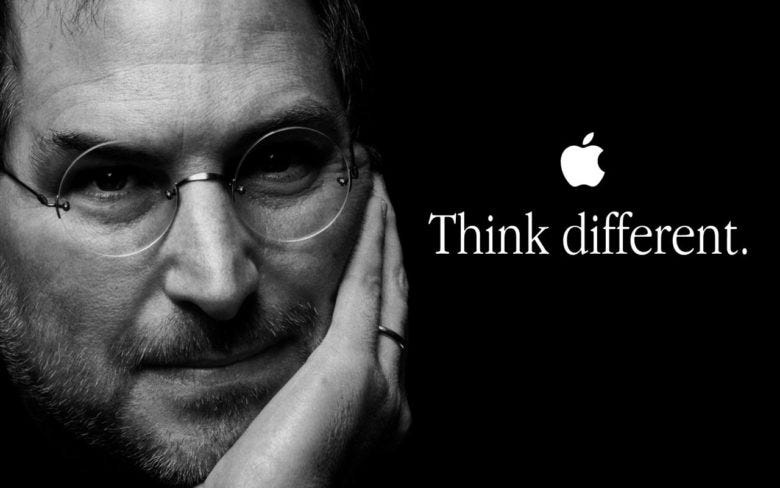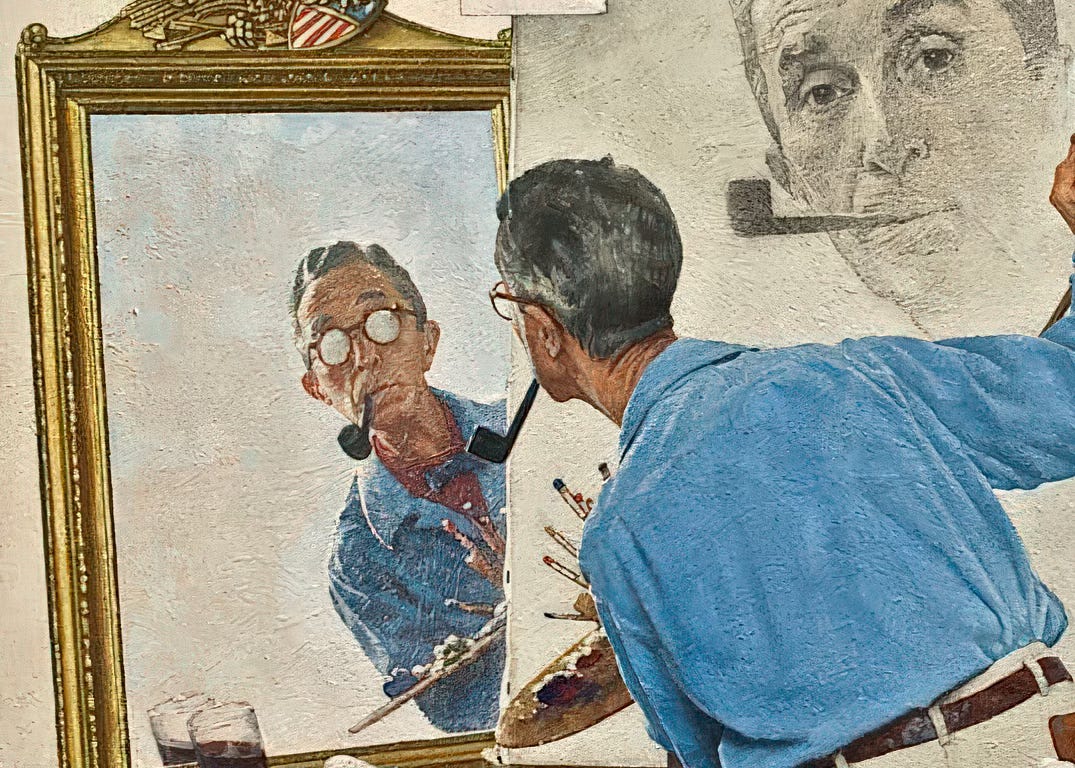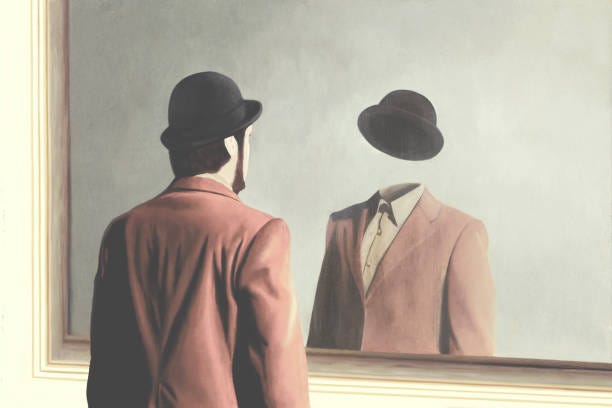How to Be Yourself, Truly!
Being your TRUE self is only possible if you're being true to who God created when he 'thought you up'. How do we come to know and BE who we really are?
“Just be yourself” – We’ve all heard that before, and maybe we tell it to ourselves from time to time. But have you ever wondered what that truly means? What does it mean to BE yourself, and what is your self? Who are you, really, and what’s the secret to being that “real you” or to “being yourself”
NOTE: For the purposes of this writing, understand “Being” as a verb, not a noun, unless a particular context makes it clear that I mean the noun, and not the verb
“…more than being “Super Religious” it’s the key to being the Super You,
Believe it or not the exploration into those questions is an exploration into how to be a saint. But more than being “Super Religious” it’s the key to being the Super You, which enables and empowers us to experienc life and the world on a completely different level. You begin to be fully alive. Let’s explore that together now.
“The holier you are, the more real you are, and you begin to feel it”
Without an awareness and understanding of who we truly are, we can’t begin to be that, and we could never identify the things that get in the way of it. Being the real you means being the “you” that God “invented” when he had you in his mind, before time began. It isn’t just religious expression, but the expression of your whole person. But getting there doesn’t happen naturally. In fact, when left to our [fallen] nature, the only natural movement is one that takes us away from our truest selves. How do we reverse course? How do we become our truest selves without being phony about it by pretending to be something we’re not?
Let me make this more real and connectable for you, through the example of something I”m experiencing right now as I write this piece.
Writing Right[ly]
This is what’s playing in my mind right now:
How should I write this piece? How should I structure it? How should I dress it up? Should I insert a clever line, or snappy witticism here, the way ‘real’ writers do? Some turns of phrase, perhaps? How do I make this piece more legitimate? Should I write it this way, or some other way, or yet another way that I haven’t considered?
Or should I just write like me, and say ‘to hell with how writers do it’? Maybe just ‘be myself’ and not the [subjective] ideal. What would that look like?
It would look like my writing, which is honest, but also has limitations. My writing is kind of linear and I don’t have the kind of mind for naturally flowing in these beautiful flourishes and clever turns of phrase that other writers have a gift for. My writing is often just a structure of statements, and occasionally I toss in a few lines from the script of what’s playing in my head to keep it interesting (←I just did it right there…←and there). So should I just write that way? Why not, right?
It's easy to say “If that’s who you are, then that’s what you should do. Just be yourself.” But the way I want to write may not be a good way to communicate, or it may not be a good style for attracting and retaining readers. At worst, my writing could make total sense to me, while being cryptic and confusing to a reader because I didn’t structure or flesh out the piece well enough. Just because the piece is “me on a page” doesn’t mean that it’s good, effective or worth a reader’s time.
So what should the formula be? That’s the question I’m asking myself right now. How should I write this? Stick to my “true” self—whatever that is—and just write how I write, or be inauthentic and try to write the way ‘writers’ do? The answer is “Yes!”
When I look at good writers’ work on Substack, in an article, or in a book, I’m delighted and inspired by how they ply their craft but I know I’m not able to write that way. Still, whether others value it or not, my writing has a value of its own. It’s neither a technical or creative masterpiece, but there are interesting thoughts and ideas in it, dressed in metaphor and sometimes allegory, or accessorized with witticisms that just come naturally (the script of what’s playing in my head). But there are limitations to my writing, too. So I have to constantly ask: How can my writing be better, or less limited so that the Good of my writing can be magnified? It doesn’t happen organically, it happens by recognizing good writing.
Analyzing and questioning the good and bad of my writing, and then perfecting it according to the ideals of good, true and beautiful writing is the same process required for ‘being ourselves’—our real and truest selves.
Now do you smell what the Blockhead is cookin’
Being True to ‘Self’
Now let’s move on and get away from writing, but let’s apply those points to the question of Being:
Ask yourself, “Who am I, truly? What does it mean for me to be myself? What is that self ? How can I be a better me, and grow to be my absolute best self?”
The exploration into those questions is an exploration into how to be a saint, not just a perfected “you” Saints are not merely rock stars of the spiritual life, they are men and women who perfected themselves over their lifetimes. They got rid of the bad, and increased or added to the good in their personalities. Our personality is where all of this action is going on. And did you know we have ‘multiple personalities’? Don’t see a psychiatrist, this is actually a good thing.
We Are More than Our ‘Personality’
Personality, and how it’s expressed, signifies who we are. But we are fundamentally more than our personalities reveal, because personality is both a temporal and an eternal reality. Okay, it’s not literally multiple personalities—you got me there. It’s more like an iceberg, where what we see on the surface doesn’t reflect what’s hidden beneath it.
Our temporal personality (who we are in life) is built on the foundation of what I call our eternal personality, which is who we are as God designed us—uniquely—and created us from eternity.
Our temporal personality is developed over time by our choices and by our experiences, and not all of those influencers are good. Just as bad material makes a bad product, our bad choices, sins, and experiences misshape the person God created. The temporal “you,” which should express the eternal personality, becomes a disfigurement rather than a reflection of the person God made. To put it theologically, we retain the unchangeable image of God, but we gradually degrade the likeness of Him who created us.
‘From the beginning, it was not meant to be so.
Time (by our choices and experiences) has a way of shaping our personalities—who we become on top of who we truly are (our true Being). Our temporal personalities, expressed in our lifestyles, choices, and habits, can become a disfigurement of our eternal ones—a distorted image of who we truly, deeply are, as God created us. We don’t simply become “a different me”; we literally become undone, and we simply mask it or numb the pain of it by putting on the suit of “a different me.” The suit doesn’t change the truth of who’s wearing it. Sometimes we’re conditioned to believe that by merely thinking “different” we set ourselves on a path for renewal and self improvement when, in fact it’s an attitude that can sometimes get us more lost.

Thinking “different” is not the key to perfection. It only advances the lies we tell ourselves. The key to being the good, true, beautiful you is to turn to the Person who “thought you up” from the beginning. Who knows your perfection better than Him who designed you?
So let’s look into the two ways of learning how to be yourself: turning to God, who created you, and turning to Jesus, who lived the example to follow.
Just as I look to the ideals of good writing to guide a process of perfecting my own writing, we have to look to the ideal of Being in order to understand how we must perfect ourselves. Mind you, “perfecting” ourselves is about becoming who we really are.
“Be perfect as your heavenly Father is perfect”
Be perfect by ‘Being, perfectly’. When Our Lord tells us to be perfect, he isn’t calling us to something that’s impossible for us to achieve. He’s not calling us to literal perfection, which only happens in Heaven. Rather, he’s calling us to the path, course and process of perfection. In other words this call to be perfect is really a call to work on our perfection—to try and never stop trying to be more like God.
We do that, first, by knowing the ideal of human Being. First, the ideal is Jesus Christ. He’s the new Adam. His humanity is what humanity was before the fall. Look to the Gospels and sacred tradition to begin understanding the ideal of Jesus Christ, and pray and meditate on the Gospels to understand Him more deeply and correctly. It’s a mistake to believe that Jesus was such an amazing guy because He’s God. Yes, He’s True God, but the Jesus of the Gospels is every bit as human as you and I. We see God in His miracles and messaging, but we’re seeing a man in most everything else.
The next bit of guidance I want to share with you is something less obvious than “Get to know Jesus.” To understand who you are, ask the inventor of who you are.
God didn’t just create you; He designed you. You’re not just the result of the unity of your parents, who provided the biological material for what you are. You are created on purpose and with intention by God, who made who you are. He thought you up. In human terms, He had this amazing idea in His head and spent a lot of time on that idea to come up with this perfect, beautiful, great “invention” of a someone whom He made happen in your mother’s womb. And that someone is you! You are completely unique and absolutely unrepeatable. The angels, who witnessed the creation of space and time, were awestruck when you came into being.
Angels: “The sun and the stars? Eh! Kinda neat. Not as amazing as You are, God. The cosmos and everything in it? Not bad, not bad. Not nearly as amazing as You are, God. But the human person? What?!...”
And not just the human person in general, but your person—you are awe-striking. I imagine the guardian angel that eagerly agreed to watch over you since before time began waited with unspeakable anticipation for your arrival when the time came.
Then, in the fullness of time, you were conceived—you “became.” Once that happened, things immediately started to go south. Original sin instantly degraded what God “thought up.”
“…Behold, I was born in sin. In sin did my mother conceive me”
And then actual sin (sins of our own actions) followed.
“Against you, you alone have I sinned; I have done what is evil…”
Psalm 51:5-7
To be holy and to become a saint is a process of returning to what God thought up when He had you in his mind. It involves a life of sacramental grace and turning away from sin but also involves reforming your temporal personality to be accordant with your eternal personality—being the you in this life, that God created from eternity.
Be, Fully Alive
Remember, I call it personality; that means it’s about the expression of your whole person, not just about religious and spiritual practices. Not to diminish the essential nature of practicing the faith and living the sacramental life of the Church, but I’m trying to add something to the picture that is almost always overlooked—being fully alive as God created you.
Your likes, loves, passions, talents and gifts are characteristics of God’s invention of you. Those personality traits are enhanced and magnified as you grow in holiness. Do you love art? You’ll love it a lot more as you grow in holiness. Do you love reading? Skateboarding? Listening to music? Playing music? Exercise? Cooking? You’ll experience all of it differently the more holy you are. Because as we become more holy we’re not only more like God, we’re also more like our true selves, the person God invented. And in that progress we begin to see and experience life differently—more acutely, more completely. We dont’ simply exist, but become fully alive.
Yes, we also grow in goodness and charity, and we experience God differently, too. But all of that is obvious, isn’t it? What I wanted to do here is to show you that holiness is about much more than being super-religious. It’s about being a Super You. Those two things go hand in hand.
Be who you are. Be yourself. But go to the Father and Jesus Christ to find out who that is, what that means, and how to enact it. Remember that Jesus prayed often, but he also laughed, enjoyed his friends, enjoyed a good meal and even partied. God made us to be fully alive. Don’t let the ugliness and falsehoods of life, lifestyle, and bad choices keep you from that destiny. We’ll only have ourselves to blame for it. Be you. Be holy. Be saints. Those are all the same thing.
Ave Maria, Virgo Fidelis!





